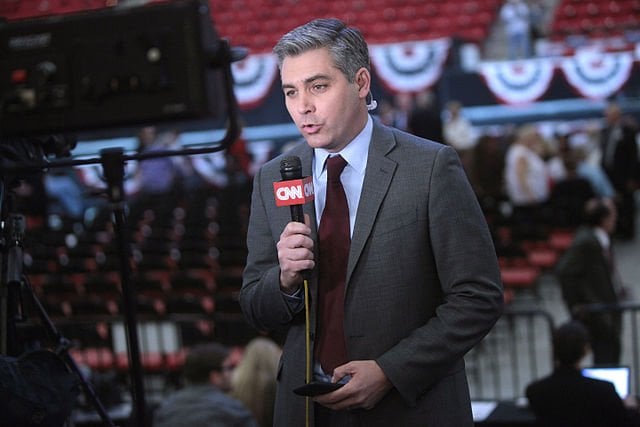Jim Acosta – first amendment rights – Denial Of Press Pass Or Of Xmas Dinner = Same Result
WASHINGTON, D.C. (November 19, 2017) – Although many are mistakenly hailing Jim Acosta‘s initial win as a victory for the First Amendment, it is nothing of the kind since the legal analysis and result would have been the same if Acosta had abruptly been denied a seat at a White House Xmas dinner (obviously with no free speech implications), suggests public interest law professor John Banzhaf, who has won several First Amendment cases, including the one which banned cigarette commercials on radio and television.
Federal Judge Timothy Kelly clearly said that he based his decision on the Due Process clause of the Constitution, not the First Amendment. The former provides that no person may be deprived of an interest in the nature of either liberty or property without some kind of Due Process notice and hearing.
Q3 hedge fund letters, conference, scoops etc
This constitutional Due Process protection has long been held to apply to many interests which clearly enjoy no constitutional protection at all, including, for example, not being arbitrarily expelled from a college, not being suspended even briefly from grade school, not being fired from certain jobs, etc., notes Banzhaf.
This can be illustrated with a simple hypothetical example.
Suppose, by long standing tradition, national TV on-air correspondents are invited to a special Christmas dinner - with no governmental officials present - at the White House, but this year an otherwise eligible reporter is suddenly and abruptly barred.
Although there is no possible infringement of any First Amendment right, and no one reporter has any constitutional right to be present at the dinner, it would constitute a deprivation of a protected liberty interest since it is a perk of his position as to which he has a reasonable expectation, and it would create a stigma - two of the conditions for making it a protected liberty interest.
Thus, under the Fifth Amendment and Due Process, and not the First Amendment and Free Speech, he is entitled to at least some Due Process procedural protections - i.e., whatever process is due under the circumstances. This is exactly what the judge ruled with regard to Acosta and, as the judge himself clearly said, it has nothing whatsoever to do with free speech or the First Amendment.
While some commentators have tried to characterize this initial decision as a great victory for freedom of the press, others, likewise incorrectly, have sought to minimize its importance.
They opine, for example, that all the White House is now required to do is to provide Acosta some kind of little hearing, perhaps just a trumped up one, and then he can be expelled permanently.
But that is also clearly not true.
Even assuming that a president has no legal obligation to provide any press conferences, and that no specific reporter has any guaranteed right to attend a press conference, barring a reporter from the conference must meet certain very strict constitutional tests.
Specifically, any content-based restrictions on protected speech are legally valid and constitutional only if they:
(1) "serve a compelling (not merely important) governmental interest," and
(2) are "narrowly tailored to serve that compelling governmental interest."
Thus, in the closely related Sherrill case which is controlling upon Judge Kelly, the court ruled that given the "important First Amendment rights implicated by refusal to grant White House press passes to bona fide Washington journalists, such refusal must be based on a compelling governmental interest."
So, for example, it might be difficult to persuade a judge that prohibiting followup questions serves a compelling governmental interest. Moreover, there are clearly less restrictive alternatives for achieving this goal, such as having the staff turn off a reporter's microphone once he has asked an initial question.
Moreover, while a president or press secretary has considerable discretion as to whom they will call on, even that discretion may be limited by the Constitution.
For example, if the press secretary repeatedly refused to call upon certain reporters solely because they were African American, or solely because they were Jewish, that would constitute unconstitutional discrimination in violation of the Equal Protection clause.
Similarly, if she repeatedly refused to call upon certain reporters solely because their reports were very critical of the president and his policies, that would probably constitute an unconstitutional violation of the reporter's rights under the First Amendment.
Since, in any of the hypothetical situations immediately above, the press secretary might claim that something else was the reason the reporter was never called upon (e.g., he was rude), a hearing to determine the truth - under the appropriate legal standard of proof, and providing certain procedural protections - would have to be held, and any such hearing might then be subject to judicial review.
Exactly what restrictions this president or his staff might seek to impose upon reporters, and what ones if any the court will permit, remains to be seen
In the Sherrill case, the court held that denial of White House credentials, allegedly for security reasons, was a sufficiently grave infringement on press freedom that it couldn't be based upon a whim or an unverified impression.
Rather, the Constitution required, at the very least, "notice of the factual bases for denial, an opportunity for the applicant to respond" and "a final written statement of the reasons for denial."
Notably, the court specifically prohibited "content-based criteria for press pass issuance."
So neither analysis - that the initial decision is a great victory for freedom of the press, or that it is meaningless because it requires only a perfunctory hearing - is accurate or complete. It's clear, although Kelly has yet to rule upon it, that the First Amendment is implicated, but exactly what it will require in this situation has yet to be determined, says Banzhaf.
JOHN F. BANZHAF III, B.S.E.E., J.D., Sc.D.
http://banzhaf.net/ jbanzhaf3ATgmail.com @profbanzhaf





